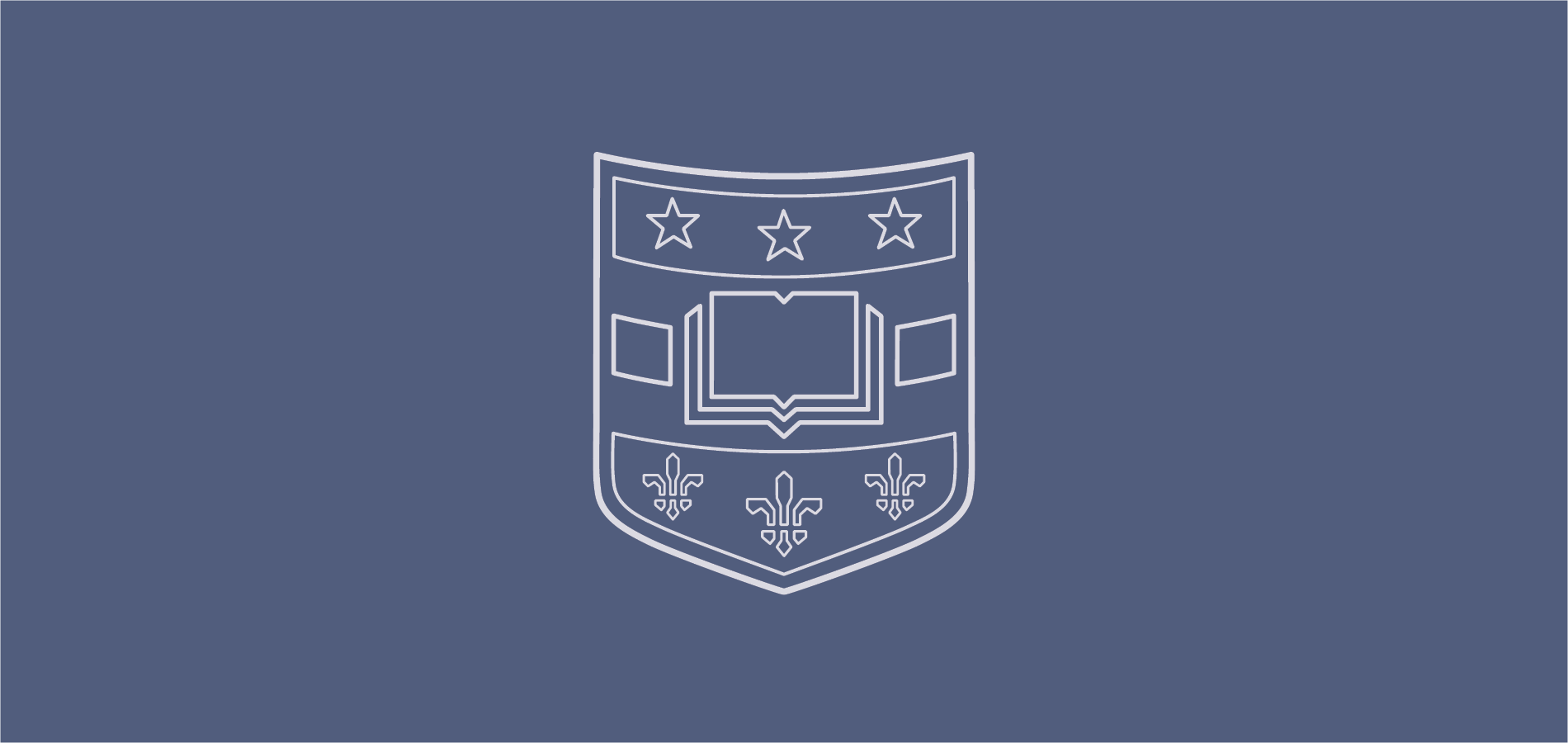
What is the Word: Celebrating Samuel Beckett—Day 2
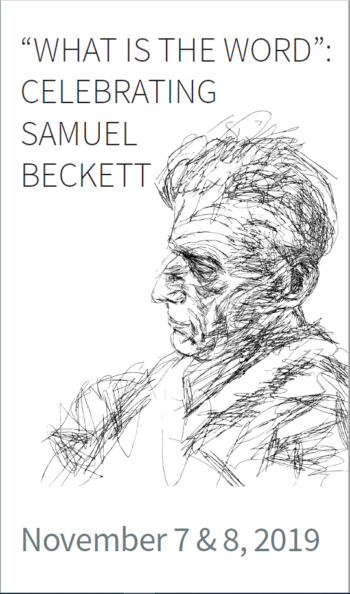
On November 7 and 8, 2019, Washington University celebrated the prose, poetry, drama, translations, correspondence and archives of Samuel Beckett, with a colloquium that included presentations, readings and performances by faculty, students and visiting scholars. The colloquium was held in Olin Library and Mallinckrodt Center, in conjunction with the exhibition in Olin Library, “Connecting Contexts: The Modern Literature Collection and The Letters of Samuel Beckett,” a collaborative effort that brings together two important resources on Beckett studies. A digital version of the exhibition is coming soon.
Day 2 of the colloquium started with two alums of Washington University. First, Christian Jacobs, French teacher and world languages chair at Park Tudor School in Indianapolis, presented “Decoding Critical Secrets in the Beckett Archive,” a talk that highlighted his work encoding many of the notebooks and manuscripts in the Samuel Beckett Papers with TEI XML markup, for eventual inclusion in the Samuel Beckett Digital Archive.
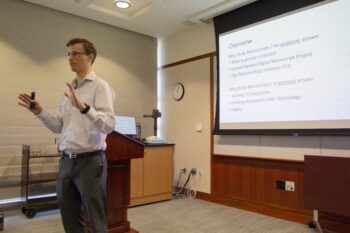
Jacobs also discussed how manuscript study–especially Beckett’s manuscripts–dramatically altered his personal and professional trajectory in life. Audience members were given the opportunity to decipher Beckett’s challenging handwriting, with scanned pages from one of his notebooks.
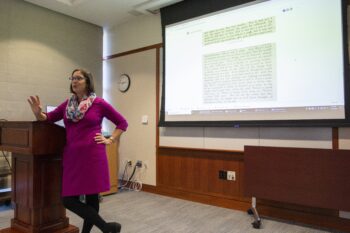
Next, Anna Teekell, assistant professor, Department of English, Christopher Newport University, presented “‘Wild and unintelligible:’ Making Sense of Beckett’s ‘unreadable’ Watt.” Using images from the galley proof held in Special Collections, among other graphics, Dr. Teekel told the story of Beckett’s enigmatic, last English-language novel, written during his World War II years in Paris and Vichy France, but not published until 1953.
Two sets of two seminar sessions followed, first with Bo Cao, who also presented on Day 1, to discuss the intricacies and challenges of translating Beckett’s correspondence, versus his published work. Simultaneously, Lois Overbeck, who would also present later in the afternoon, demonstrated the Location Register and Linked Data Project of The Letters of Samuel Beckett Project at Emory University. She also invited feedback and questions from the audience, most of whom were scholars who would use this resource or others like it.
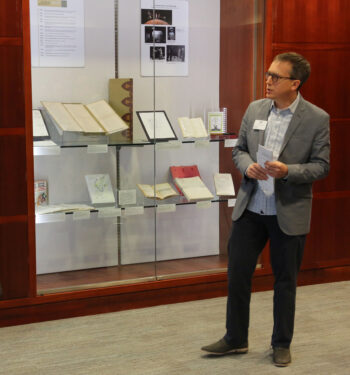
Following Dr. Cao’s and Dr. Overbeck’s seminar sessions, Joel Minor and Kyle Young giving exhibit tours of “Connecting Contexts” in the Ginkgo Room and “If you could finish it…” in the Special Collections Reading Room. Erin Finneran, who led a discussion of Film on Day 1, also gave a presentation during this time, called “Nohow On: Beckett in the Classroom,” which explored ways to break down potential barriers to teaching Beckett’s life and work.
“Archival Re-membering: The Letters of Samuel Beckett,” by Lois Overbeck, co-editor of The Letters of Samuel Beckett and director of The Letters of Samuel Beckett Project at Emory University, wrapped up the Day 2 sessions. It was Dr. Overbeck who approached Joel Minor about the idea of an exhibit at Washington University, based upon exhibit materials she and others had developed at Emory, which led to not only to the “Connecting Contexts” exhibition but the “What is the Word” colloquium.
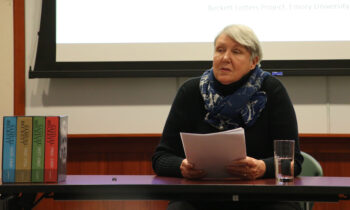
In an engaging narrative, Dr. Overbeck explained the remarkable amount of research involved in putting together The Letters of Samuel Beckett, a project over thirty years in the making, started under Beckett’s own direction, in 1985.
She then presented the arc of Beckett’s writing life–with excerpts from the thousands of letters she and others located in their research and included in the four published volumes. She concluded with thoughts on how the letters and archives of one of the 20th century’s most important writers add a great deal to the understanding of and appreciation for his work.
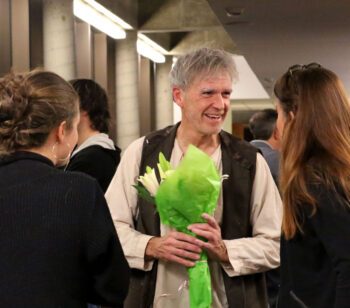
We returned to Mallinckrodt Center for the premier performance of Robert Henke, professor of drama and comparative literature, Washington University, in Krapp’s Last Tape. To a standing-room-only audience, Henke brought Beckett’s beloved one-man, one-act play to life, embodying all the humor and woe that the role demands. Considered Beckett’s most autobiographical play, and centered on a man coming to grips with his past through his personal archive, Krapp’s Last Tape was especially apt for the colloquium. After the performance, Dirk Killen, Associate Dean, College of Arts & Sciences, Washington University, moderated a question and answer session with Henke and the audience.
Book sales and a reception followed, also in Mallinckrodt Center. Though the colloquium concluded Friday evening, Henke performed Krapp’s Last Tape two more times that weekend, giving those who could not attend Friday the opportunity to catch the show. All performances–as well as the colloquium sessions–were free and open to the public.
Most of the sessions at Olin were video recorded and will be available on our YouTube channel soon